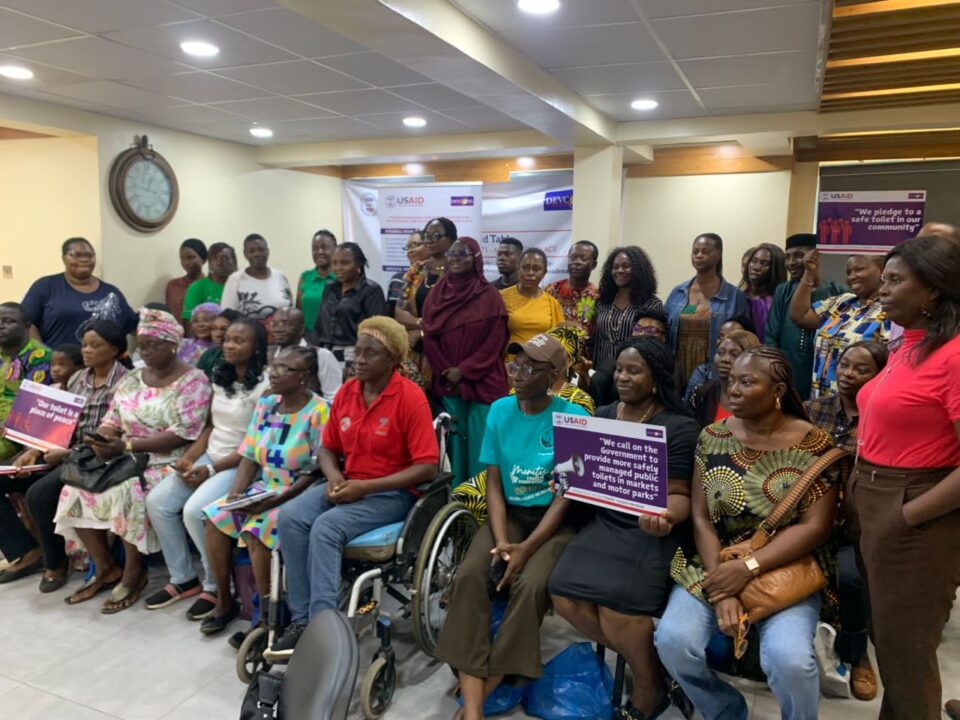Cyriacus Nnaji
Lagos State, the Centre of Excellence and Aquatic Splendor, has made tremendous efforts towards ensuring environmental sanitation and quality health of its citizenry. Part of that calculated determination for a cleaner Lagos is the recent roadmap for Open Defecation Free Lagos State.
This beautifully encapsulated agenda for clean Lagos was brought to the fore during a Media Roundtable to mark the 2024 World Toilet Day which took place at Youth Empowerment Centre, Surulere, Lagos State on Friday, 21th November, 2024. The Media roundtable co-hosted by USAID and DEVCCOMS, was to strengthen community based organisations’ (CBO) capacity for WASH sector effectiveness and accountability in Lagos State.
In her presentation titled ‘Curbing Open Defecation in Lagos State: Towards a Multi-Stakeholder Solution through Lagos State Roadmap, Mrs. Bamigbade Ebunola Sesi, Deputy Director Sanitation Services Department, Office of Environmental Services, Lagos State Ministry of Environment and Water Resources, who represented Dr. Hassan Sanuth, Director Sanitation Services in the same ministry, itemized the state government’s plan of action to achieve an open defecation free Lagos, which include advocacy and enlightenment, regulations and standardization, bridging infrastructural gaps, and monitoring, evaluation and enforcement.
She stated that in the area of advocacy, there is a need for community sanitation campaign, launching the clean Nigeria campaign at the local government levels, among others. On regulations and standardization, she added that there is also need to ensure development and implementation of technical guidelines, approval and regularisation of public toilets operations in Lagos State, and promotion of improved technology through sanitation marketing and capacity development.
Speaking further on the roadmap, she talked about bridging infrastructural gaps, which she disclosed could be achieved through implementation of the state resilient strategies as specified in pillar 1 ,Goal 2 , initiative 1 of the Lagos resilient strategies, rehabilitation and upgrading of public toilets in public places, reactivation of toilets in service stations for public use in Lagos and most importantly exploring opportunities in Public Private Partnerships, corporate social responsibility and private sector participation; while also happing on monitoring the state environment, regular evaluation of existing public toilets in the state, enforcement of compliance to established guidelines and sanitation standard the state.
Sesi said that currently there are 1500 public toilets scattered across the state, out of this, 367 were constructed by the state, while 625 were registered in compliance with sanitation standards. She added that the other ones are undergoing regularisation to meet sanitation standard. She said Lagos needs additional 1650 public toilets of 8 cubicles per unit to achieve access to adequate and equitable sanitation and hygiene for all and end open defecation by 2030 (SDG 6.2).
Speaking on “Toilet, the Place of Peace” which was the theme of this year’s World Toilet Day, Akin Jimoh, the Program Director, Development Communications Network, said there is need to dispose what is taken into the body in order to remain healthy.
Jimoh also spoke on the LUWASH project, “The project we are working on, the Lagos Urban Water, Sanitation and Hygiene project (LUWASH), funded by USAID, is to see how we can strengthen CBO capacity for Wash Sector Effectiveness and Accountability in Lagos State. For us the key thing is for us to look at issues from the perspective that benefits the community members. Are there provisions of toilets for public use, are there provisions of toilets in homes” And when I said toilet, it is not just a facility but it has to be something that is up to standard.”
Speaking on Lagos State government’s efforts to curb open defecation, he maintained that it is the responsibility of everybody to fight the scourge “When you say government, who is government? We are all government. When we say public toilets, what of toilets in our homes? There are places you go, there is no facilities and the mindset itself has to change. So we talk about government, we left everything to government, but it is now left for us as civil society organisations, as media, as community members, to do the needful that would benefit everyone and those are the issues.”
Jimoh who decried the multifaceted economic implications of open defecation, addressed the issue of 2030 target for eradication of open defecation and what Lagos State can do to achieve that goal, he said “If you look at most of the things we discussed, there are a number of things proffered as solutions, there are situations where effluents from households are emptied into the drainages, are we reporting them? There is need to give feedback to government. There is need for behavioral change. Collaboration among government agencies, different units addressing different areas is necessary. The other thing is the issue of destitute. Do we have the social security system that can address a number of issues? For open defecation we need to provide more toilets, urban planning standard that will need to be looked into, we need to address those things.”
He also said that there are toilets that are not open to the public that are supposed to be open to the public. “Every public facility should have standard toilets. Then fuel stations, it supposed to be a place of comfort, you are travelling and along the way you should be able to move into a fuel station and use the facility. These are things that happen in other places. But do we have such facilities. We can only help government by looking at it that we are also involved, we are also affected, and there is need for collaboration between the media, the organisations, community members and so on and so forth,”Jimoh stated.
Mrs. Mercy Nwigwe from an NGO, Intellectual and Special Need Group, “I want to thank USAID and DEVCCOMS. In fact the Toilet Day awareness is very important, I have learnt a lot as a special need person. Number one, I have learnt that as a person, I should be clean, I should be able to keep my surroundings neat and I should also be able to advocate, for example, there are people that have just one toilet where they have 20 tenants, there should be more toilets there, so I should be able to speak out, sensitise people especially in my school and my NGO. I should be able to tell them that a lot of sicknesses and diseases are contracted through the toilet.”
Oluwayemisi Taiwo, CEO of Community Advocacy averred that she was overwhelmed with the concept of the roundtable. “I was overwhelmed with the program that DEVCOMS and USAID put together, especially the Open Defecation Free Lagos Roadmap, the action that they want to put in place now, like advocacy and enlightenment, regulation and standardization which will make us to engage in more action against open defecation. Then addressing infrastructural gaps, I think with this we would get to where we are going on open defecation.”
Architect Mojibayo Akinjiyan, a Clergy, who also runs a Community Based Organisation (CBO) and Executive Director, Life Anchor, an NGO based in Lagos, while speaking on the causes of open defecation pinpointed inadequacy of toilet facilities and the people’s mindset as major issues. “One is the fact that there is not enough infrastructure, that is public toilets, they are not adequate, which people can make use of. The other one is the behavioral pattern of the people has to change because if we want a decent environment, we must behave well, we don’t have to behave anyhow, maybe because of cultural background, we all have to do the right thing.”
He also advised the government to commit more funds into water and sanitation. “We also discovered that on the part of government, we need to have more funds budgeted for water and sanitation, particularly looking at it from the standpoint that from record Covid killed over 3155 people in Nigeria and look at how much billions that was pumped into Covid, more people are dying every day because of these diseases that are preventable because we are not paying serious attention to them. So government needs to put more funding to it, do more enforcement, not just saying it but going to really do it and at the same time do more of campaign and training to build the capacity of their staff.”
Oluwayemisi Taiwo, CEO of Community Advocacy averred that she was overwhelmed with the concept of the roundtable. “I was overwhelmed with the program that DEVCOMS and USAID put together, especially the Open Defecation Free Lagos Roadmap, the action that they want to put in place now, like advocacy and enlightenment, then regulation and standardization which will make us to engage in more action against open defecation. Then addressing infrastructural gaps, I think with this we would get to where we are going on open defecation.”
Architect Mojibayo Atijiye, a Clergy, who also runs a Community Based Organisation (CBO) and Executive Director, Life Anchor, NGO, Lagos, while speaking on the causes of open defecation pinpointed inadequacy of toilet facilities and the people’s mindset major issues. “One is the fact that there is not enough infrastructure, that is Public toilets, they are not adequate, which people can make use of. The other one is the behavioral pattern of the people has to change because if we want a decent environment, we must behave well, we don’t have to behave anyhow, maybe because of cultural background, we all have to do the right thing.



